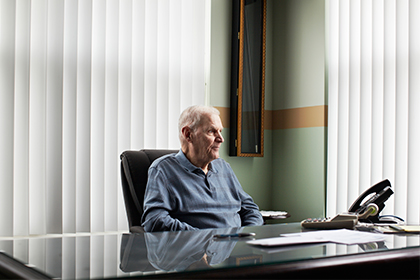AARP Hearing Center

By Jill Gambon
When Springfield resident Prettlo Heartley Jr., 73, needed to travel due to a death in his family, he used the refund he received through the state’s Circuit Breaker Tax Credit program to help cover his airfare.
“The money came in handy,” said Heartley, who has received refunds of more than $600 for the past two years. “It really did help.”
Like Heartley, thousands of Massachusetts residents 65 and older are getting annual refunds through the program.
“It’s money in your pocket,” said Dean Strack, 79, of Westwood, a retired management consultant who has gotten the tax refund for the past eight years. “Every little bit helps when your income is fixed.”
Strack, an AARP Foundation Tax-Aide volunteer, prepares tax returns for more than 1,000 mostly low- and moderate-income residents every year. Between 60 and 70 percent of those people usually qualify for the credit, he said. “People are thrilled to get it.”
Tax-Aide alert to eligibility
Tax-Aide is a free tax preparation service run by IRS-certified volunteers. The volunteers make sure taxpayers are aware of the credit and help those who are eligible apply for it, said Tom Ligon, 77, of Hull, state coordinator of Tax-Aide.
The Circuit Breaker program was created to provide property tax relief to older homeowners and renters who meet income and other requirements. In 2012, more than 86,000 taxpayers claimed nearly $67 million in refunds, according to the state Department of Revenue. The average refund in 2012 was $774.
“Property taxes are high everywhere, and a lot of people are hard-pressed to stay in their homes,” Ligon said. The Circuit Breaker refund can make it more affordable for people to remain in their residences, he said.
“It can be a lifesaver for some people,” said Norma Simons Fitzgerald, executive director of the Council on Aging in Sharon, a town where more than 300 taxpayers claim Circuit Breaker refunds each year.
Some people use the refunds to pay for necessities like food, medicine or utilities, she said.
Eligibility requirements change from year to year. For 2013 tax returns, total income for single people cannot exceed $55,000 ($69,000 for a head of household or $82,000 for a married couple). For homeowners, the assessed value of their primary residence cannot be more than $700,000.
Doing the math
Eligible property owners can claim a credit equal to the amount by which their property tax payments—including water and sewer charges—exceed 10 percent of their yearly income. Renters can claim a credit if 25 percent of the rent they paid is more than 10 percent of their annual income. What’s more, eligible taxpayers can file for the credit up to three years retroactively.
Even people who don’t typically file returns because they don’t owe taxes can apply for the refund. While the number of taxpayers claiming the refund has been increasing over the years, the Department of Revenue does not have an estimate of how many of the state’s 957,000 residents 65 and older are eligible to receive it.
Simons Fitzgerald, who cochairs a property tax relief task force for the Massachusetts Association of Councils on Aging and Senior Center Directors, said many taxpayers don’t realize they are eligible.
“It goes by the wayside for a lot of people. They don’t think it applies to them,” she said.
Tax-Aide volunteers, local Councils on Aging, the Department of Revenue and others are trying to get the word out through fliers, workshops and word of mouth.
To find a Tax-Aide location, visit aarp.org/findtaxhelp or call 888-227-7669 toll-free. For information about the Circuit Breaker Tax Credit, visit mass.gov/dor/seniors or call 800-392-6089.
Jill Gambon is a freelance writer and editor based in West Newbury, Mass.































































